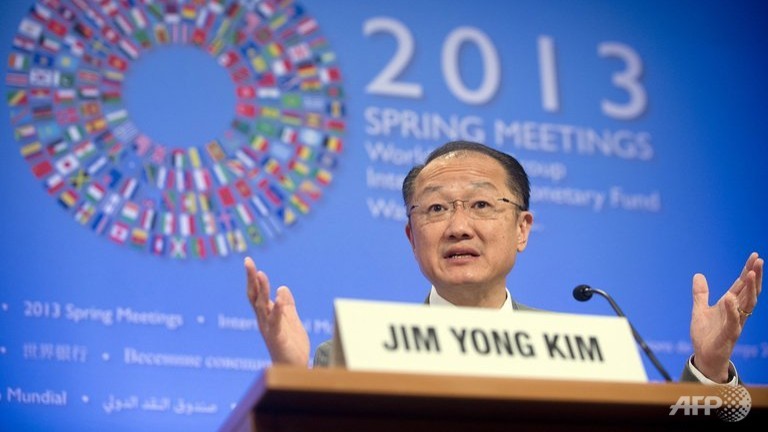World Bank "relevant" despite BRICS bank plan: Jim Yong Kim

World Bank Group President Jim Yong Kim speaks during a press briefing at the IMF Headquarters in Washington, DC. (AFP/Saul Loeb)
WASHINGTON: The World Bank will remain relevant to the developing countries despite a plan to launch a rival bank by the BRICS emerging powers, Bank president Jim Yong Kim said Thursday.
"I really have no doubt in my own mind about our continued relevance for a very long time," Kim said at a news conference opening the World Bank and IMF spring meetings.
"It's true that the BRICS countries, many of them are extremely well financed and have money, but they continue to come to us for very specific reasons," he said
"There's still no question that the quality of our experience, the quality of our knowledge, our ability to help them actually deliver on their promises to their people is what keeps them coming back to the World Bank Group."
In late March, leaders from the BRICS -- Brazil, Russia, India, China and South Africa -- agreed to create a joint infrastructure lender to rival Western-dominated institutions like the World Bank.
The planned bank is seen as a way of gaining influence on the world stage, countering Europe's dragging economic crisis and addressing the $4.5 trillion in infrastructure spending the BRICS are estimated to need over the next five years.
But Kim said that in visiting the BRICS themselves, he did not experience "even slightly" a decreasing demand for World Bank services.
Kim pointed to the World Bank's 66 years of experience in building infrastructure.
"Every single one of the BRICS countries has an enormous infrastructure deficit that simply can't be met by a single institution, certainly not the World Bank in and of itself," he said.
There are "plenty of infrastructure needs to go around," he added.
Some analysts have expresses concerns that the new bank will impose less rigorous conditions with its loan than the World Bank, making the BRICS bank more attractive to borrowers.
But Kim defended his institution's stricter approach.
"We see the safeguards, we see our careful attention to detail, we see our attention to corruption as assets," he said.
"As more organizations, countries, funds go out and begin lending in developing countries, my own sense is that they're beginning to understand the value of this kind of careful approach."
What the stars mean:
★ Poor ★ ★ Promising ★★★ Good ★★★★ Very good ★★★★★ Exceptional
Latest News
More News
- State corporations poised to drive 2026 growth (February 03, 2026 | 13:58)
- Why high-tech talent will define Vietnam’s growth (February 02, 2026 | 10:47)
- FMCG resilience amid varying storms (February 02, 2026 | 10:00)
- Customs reforms strengthen business confidence, support trade growth (February 01, 2026 | 08:20)
- Vietnam and US to launch sixth trade negotiation round (January 30, 2026 | 15:19)
- Digital publishing emerges as key growth driver in Vietnam (January 30, 2026 | 10:59)
- EVN signs key contract for Tri An hydropower expansion (January 30, 2026 | 10:57)
- Vietnam to lead trade growth in ASEAN (January 29, 2026 | 15:08)
- Carlsberg Vietnam delivers Lunar New Year support in central region (January 28, 2026 | 17:19)
- TikTok penalised $35,000 in Vietnam for consumer protection violations (January 28, 2026 | 17:15)
















 Mobile Version
Mobile Version